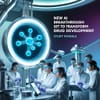A recent study has unveiled a groundbreaking advancement in artificial intelligence that promises to revolutionize the drug development process. This innovative technology is making waves in the pharmaceutical industry, offering the potential to accelerate the discovery of new treatments and improve patient outcomes.
The research highlights how AI can analyze vast amounts of data, identify patterns, and predict the efficacy of various compounds much more quickly than traditional methods. By streamlining the initial stages of drug discovery, AI is helping scientists focus their efforts on the most promising candidates, ultimately shortening the time it takes to bring new medications to market.
Experts believe that this AI-driven approach could not only enhance the speed of drug development but also reduce costs significantly. In an industry where timelines can stretch for years and budgets can skyrocket, this new technology could be a game-changer.
Moreover, the implications of this advancement extend beyond just efficiency. By enabling a more precise understanding of how drugs interact with biological systems, AI could lead to the development of more targeted therapies, minimizing side effects and improving the overall effectiveness of treatments.
As the pharmaceutical landscape continues to evolve, the integration of AI in drug development signifies a hopeful future for medicine. Researchers and companies are now more optimistic about their ability to tackle complex diseases that have long been challenging to address.


